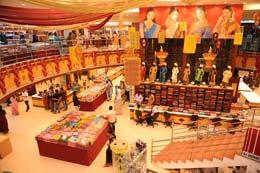It’s going to be a gloomy Diwali for India Inc.

As India prepares for Diwali this week, the festive season in what was once a global economic powerhouse is seeing high interest rates, inflation and job uncertainties cast a pall on the celebration of light.
Indicating a bleak Diwali aka The Festival of Light this year, malls across the country have reported a sharp decline -- as high as 35-40 percent -- in footfalls by festive shoppers, a new survey has revealed.
Attributed to the economic slowdown fuelled by the rupee's freefall, the steep drop in shoppers have hit the malls which are already suffering from large vacant spaces, said the survey conducted by Assocham.
The Assocham team interacted with around 650 leasing managers and mall managements, strategists, marketers and supervisors in Mumbai, Delhi-NCR, Chennai, Kolkata, Ahmedabad, Hyderabad, Bangalore, Chandigarh and Dehradun.
The festive shopping spirt was found to be the lowest in Delhi (33 percent), Ahmedabad (31), Chennai (30), Mumbai (28) and Hyderabad (27), said Assocham secretary general D.S. Rawat, terming the trend as on "expected lines as the economic recovery is rather slow and consumer confidence low".
Assocham estimated that roughly 250-300 malls came up in the country in the past couple of years but 70-80 percent of their spaces lie vacant, with the economic slowdown hitting them heavily. Several malls, unable to justify the rents they charge from tenants, are shutting down.
In the nine major cities, more than 47 percent of the total mall space remains vacant, with Delhi-NCR toping the list with 55 percent, followed by Mumbai at 52 percent, Ahmedabad at 51 percent and Chennai at 50 percent.
Several developers have started giving rent-free period of up to six months for big brands to lure retailers.
While some malls are operating at 60 percent occupancy, others struggle with less than 20 percent, mainly due to poor location, poor design and poor parking facilities, the survey found.
The industry is also facing problems like multiple taxes, lack of clarity in policies and shortage of experts in areas like supply chain and store management.
It’s going to be a gloomy Diwali for India Inc. said the Hindustan Times.
Two years ago, in the inaugural CEOSpeak survey, a majority of industry leaders expected the economy to grow at 7-8%.
Today, many would jump with joy if that were the 2013-14 rate. 51.1% of those surveyed this year described industry sentiment as ‘resigned’, with barely 20% saying there would be any economic upturn this financial year.
India’s macro-economic well-being had been under serious pressure for a few years. 2013 has, in many ways, been worse than 2012. There was panic when the rupee crossed Rs. 68 to the dollar in September. High interest rates (to combat high inflation) have sapped investment and the widening fiscal deficit has industry crying for cuts in government expenditure. But let’s be realistic, this is an election year.
And to rub salt into these wounds, the World Bank revised India’s GDP growth down to 4.7% this week from 6.1% in April.
The Hindustan Times-MaRS CEOSpeak survey is conducted among industry leaders, representing a random mix of small, medium and large-sized companies. The festive season is around the corner, but not many CEOs sounded optimistic about the economy picking up momentum post-Diwali. More than half of those surveyed (55.3%) said they expect it to be on the growth trajectory only after the general elections, slated for 2014.
What is bad news for employees, only 4.3% of respondents expect to give better bonuses than last year. Over 20% said bonuses would be lower, or worse, there would be no bonuses.
And what factors do these CEOs attribute the current economic slowdown to? 72.3% squarely blamed the failure of governance. “One part of the government presses the accelerator, the other presses the brakes. Some functionaries seem to be out to destroy the business community. A lot of people are working at cross-purposes,” said Mukul Kasliwal, chairman, MW Corp.
Close to one-tenth attributed it to economic uncertainty worldwide. “The global economy has been in the midst of a prolonged slowdown, whereas the domestic economy has been affected by slow responses to problems,” said Naina Lal Kidwai, president, FICCI.
In the midst of this gloom, high hopes have been placed on the newly appointed governor of the Reserve Bank of India, Raghuram Rajan. Famed for predicting the 2008 global recession, Rajan has taken over at a very difficult stage, with the economy at one of its weakest points in a decade. He seems to have gotten a thumbs-up from industry heads, with 61.7% saying he will be better than D Subbarao, his predecessor.
Economics and politics are inseparable. In a bid to win a third term in the Lok Sabha elections, the UPA government has been trying hard to improve its governance report card. Populist measures such as the food security and land acquisition laws have been passed.
Wary of the food security bill’s impact, over half the CEOs believe it will not yield benefits. “The risk of excess spending in a year when stocks are low is significant,” said S Gopalakrishnan, board member, Infosys, and president, CII. Kidwai feels that though well-intentioned, the bill in its present form has glitches.
The land acquisition bill also has its doubters. 46.8% feel it will slow down acquisitions and raise land costs. “It is too soon to comment on the effects of the Bill, but it seems very unfriendly to the industry,” said Kasliwal.
But there are perennial optimists such as Kidwai. “Going ahead, there should be a turnaround in business activities with the start of the festive and wedding season in India.”
Leave a comment









